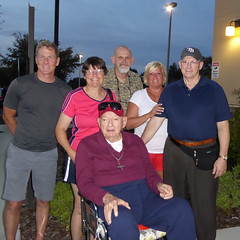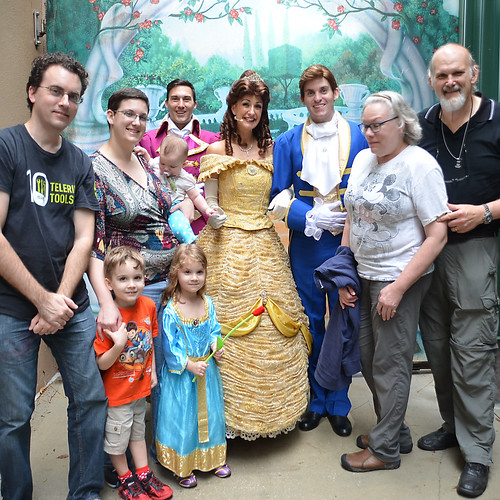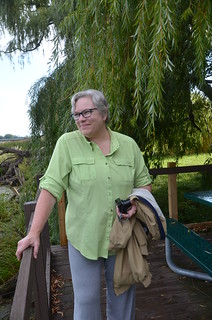Tuesday, December 27, 2016
La La Land
Wednesday, December 21, 2016
Rogue One: Brief Review with a Few Anti-Spoilers.
Sunday, December 18, 2016
Who to Thank for Clinton's Popular Vote Victory
Christmas 2016

|
Getting rest of the sadder news out of the way while we are in a somber mood, our dog, Jaxon, and our cockatiel, Sugar, also died this year. This leaves Gypsy, our remaining dog, as our only pet.
Irene and I have had a busy year. This is something I didn’t realize until I sat down to write this newsletter and took stock. I had noticed that there was never any time this year but it is only now I realize that it is because I was busy -- really, really, busy. Since last year’s newsletter we have been to the following locales: Colonial Williamsburg, The Mariner’s Museum in Newport News (Irene’s mom’s home town), Sanford NC (Chris and Reid’s house), Pennsauken Township NJ (Lee and Amber’s house, just across the river from Philly), Florida (five different times), Disney world, LEGOLAND Florida, Tampa, St Petersburg (three times, once to spend time with dad, once to be with him at the end, and once to sort out the house), The Salvador Dali Museum, the western Caribbean on a cruise ship (Honduras, Belize, Costa Maya Mexico, Cancun, and Cozumel), Myrtle Beach, Brookgreen Gardens, The Apple Festival in Hilton NY, the Charlotte-Genesee Lighthouse on Lake Ontario, The North Carolina Zoo, the North Carolina State Fair, Wilmington NC, the NC Aquarium at Fort Fisher, and Marbles Kids Museum in Raleigh.

|

|

|
Amber finishes her Emergency Medicine residency in the late spring. She and Lee and the kids will be moving from New Jersey to Oregon for her new job which she is excited about. That will put them near Lee’s family and a number of cousins about the same age as Liam (5), Eva (5), Aurelie (1 ½), and my as-yet-unnamed granddaughter due early next summer.

|
 
|
 
|

|
Tuesday, August 16, 2016
That Cute Place to Eat I Can Never Find.
Thursday, May 12, 2016
The New Castrati
On the 28th of December, 1902, the Roman paper La Tribuna announced that Pope Leo XIII had issued a decree forbidding castrati from participating in the choir of the Sistine Chapel, or in any Catholic choir. This ended over three centuries of the chapel's use of castrati -- men who had been castrated as boys to preserve their higher pitched voices. At the height of their popularity castrati had been much sought after for sacred music, and for opera where parts were commonly written for the peculiarities of their voices. A few of them had become fabulously successful and wealthy. They were the androgynous "rock stars" of their time and were much feted, although they were also ridiculed for their stork-like proportions with large chests, sharp features, and over-long arms and legs.
During the 17th, 18th, and particularly the 19th centuries the Catholic church had a "complicated" on-and-off relationship with the morality of castrating boys so they could sing the soprano parts in sacred music. Until the end of the 18th century women were not allowed to sing in church and, while boys could sing the higher-pitched parts, their voices were weak and tended to break with puberty. The church officially forbade castration for musical purposes -- anyone caught performing the operation, or associating with those who did, would be ex-communicated -- but at the same time, church choirs actively sought out castrati with superior voices and contributed considerably to the popular demand for their abilities.
With castration for musical purposes officially banned by the church, and often against secular law as well, the popular demand for castrati, together with the wealth and fame heaped on the ones who achieved rock-star status, resulted in a surprising number of "accidental" castrations. Swans were a particular threat to young men's boy bits in some of the poorer parts of Italy, as were wild pigs. If a swan bit them off, the idea went, the boy might as well head off the music school and try to become rich and famous so he could send money home to his family so they wouldn't starve. It wasn't -- exactly -- that poor families "sold" their sons, but there wasn't a lot of opportunity for advancement in the lower strata of society and the opportunity was tempting...
17th and 18th century apologists for creating castrati argued that the sacrifice of virility was more than compensated by the contributions to sacred music, and that as long as the boys consented, then castration to preserve singing voices into adulthood was ethical. Others, of course, disagreed but, with the high demand for castrati for choirs and opera, a compromise was struck: boys were castrated in secret so that the clergy and directors of operas didn't have to know about it.
From a more modern point of view a number of other ethical problems present themselves. These are --
1) No Possibility of Informed Consent: The operation is irreversible and, since it must be performed before puberty, the boy is by definition a child and not able to give mature, informed consent.
2) Unreasonable Expectations: While the occasional, wildly-successful castrato was pampered, feted, and very much in the public eye, his less-fortunate fellows -- the eight out of ten whose singing careers failed after castration -- were never mentioned and few boys contemplating the "career" had a realistic expectation of his odds for success, and neither did their families.
3) Pressure: The extreme poverty from which most of the candidates were drawn exerted considerable pressure on them to help their families financially.
4) Assumption of the Blessing of Clergy: On the one hand most people probably knew that the church forbade castration for musical purposes, but on the other hand the soprano parts in church choirs were generally sung by castrati so how serious could the objection really be? How big a problem could the castrati represent if the Pope had a dozen of them in his personal choir? 5) Sort of Pointless: While the castrato voice differs from both male and female singing voices, it is not that different from a female voice. Most parts scored for a castrato can be sung just as well by a woman soprano. The whole "no girls in the choir" thing comes from an over-literal reading of a throw-away line by St. Paul in Corinthians and, with an only slightly more-nuanced interpretation, the whole rationale for having castrated men around to sing goes away.
And some more recent history...
In February of this year the Charlotte City Council passed legislation by a 7 to 4 vote that added new legal protections for gay, lesbian and transgender people, including a controversial section that would allow transgender residents to use either a men’s or women’s bathroom, depending on the gender with which they identify. The Charlotte Observer, in a report generally favorable to the City Council's actions, nonetheless admitted that it was "a decision that will likely provoke a battle with the General Assembly, which could nullify the city’s historic vote."
The Charlotte ordinance was to have taken effect April 1st and as anticipated, in the last few weeks of March, the North Carolina General Assembly formulated and passed House Bill 2 which laid out a statewide anti-discrimination policy and invalidated the Charlotte ordinance. In particular, HB-2 establishes policies for bathroom facilities operated by state and local government agencies, including schools. The policy establishes biological sex -- as listed on a birth certificate -- as the criterion for which facility an individual should use. This sounds more restrictive than it is. Most states will issue a new or amended birth certificate after sex-reassignment surgery.
Then on to my point...
A few weeks ago a photo started showing up in my Facebook newsfeed. It showed a pretty young boy with long light-brown hair. He was wearing lipstick and eye makeup and if you clicked through to his story it was about his "transitioning" to become a trans-girl, having just started estrogen shots at the age of fourteen. The reason my "Progressive" Facebook friends were sharing it was because of their opposition to North Carolina HB-2 which, among other things, would require the young person shown to use the boy's restroom at school because he is biologically male. They are sure that it would be a slam-dunk on this issue since those of us who support HB-2 would surely see that this innocent young boy/girl/person-of-intermediate-gender would probably get beat up in the boy's room. He might have his tender young breasts groped, or she might be kicked in her testicles.
And it was actually something of a slam-dunk for me... only the other way 'round. It reminded me how much I support HB-2. More precisely, it reminded me how much I think the Charlotte ordinance was a bad idea. It's because of that poor young boy in lipstick with his picture all over the Internet. I understand that gender dysphoria is painful and that he is terribly, terribly confused. But he is still a child, giving him estrogen will have permanent effects, and he isn't old enough to give informed consent for something like that. I suppose the idea for his transition is that he would show up in high school passing for a girl. Would that have worked? Maybe. He makes a convincing girl, quite a pretty one in fact. But that is shot to hell, isn't it? His face is all over the internet. He's not going to sneak into the girls room for a discrete, seated pee if he shows up at the bathroom door with a TV news crew, a flying wedge of butch, lesbian bodyguards, a legal team, a mariachi band and a pink piñata filled with complementary cosmetics. He's been ratted out by the fashionable moral preening of the champions of societal change.
One of the reasons that free-range, gender-of-the-day bathrooms/locker rooms/showers at schools seems like a bad idea to me comes from a recollection of my middle school days a long, long time ago. Some enterprising young men discovered that if one boy stood on the shoulders of another he would be just high enough to peer in the skylight window of the girls' P.E. shower room. I, of course, never did anything of the sort. I am above that sort of thing... A tower of virtue... and rather too heavy to be the man on top so what would be the point? But, anyway, teenage boys are pretty interested in the parts of teenage girls that they don't usually get to see. Interested enough to probably be pretty annoying. Note that I am not talking about transwomen here. They hadn't been invented yet. It's the straight boys I want to keep out of the girls facilities. If teenage boys will stack themselves up like Russian acrobats to sneak a peek they will lie about their feelings about their gender.
Reading the research about gender dysphoria and its treatments one is struck by how early in the process it all is. If gender transitioning were a drug that had to be approved by the FDA it would be early in the first stages of trials where the proposed drug is shown merely to be safe, and the next phases of the trials -- where it's effectiveness is shown -- would be years away. There is a general agreement in the field that children with gender dysphoria tend to get over it. A clear majority of girls, and an overwhelming majority of boys, who identify with the other gender as children will become adults who identify with their natal gender. Somewhere between 80 and 95 percent of pre-adolescent boys will become adults who identify as male, with a majority of them being homosexual but, nevertheless, reasonably happy with their bodies. Girls tend to persist somewhat more often with gender dysphoria but even then something like three out of four will grow up to identify as female. Adolescents, on the other hand, are said to seldom get over gender dysphoria and will probably require treatment. The question of how young, gender-dysphoric boys come to be male-identifying gay men without passing through adolescence is never clearly explained.
There is almost no data on outcomes of treatment where gender-transitioned individuals are followed to see how they get on, and what data has been collected is of low reliability. I did find one study that showed that teens receiving hormones seemed less likely to commit suicide than their untreated counterparts but the study was statistically underpowered (not enough participants) and there was no way to show that the benefit didn't arise simply from having their problems taken seriously -- no way to know if saline injections and a really good pimple cream wouldn't have had the same benefit.
Furthermore, there are a few studies that appear to show that long term problems frequently persist for those who transition. Recent studies that followed transsexuals in Sweden and Denmark found significantly higher rates of psychiatric problems, suicide, and attempted suicide among them than in the overall population. Other recent studies found high rates of "non-suicide self-injury" in similar populations in Belgium and the UK. There is no way of knowing, with this sort of study, how they might have done had they not transitioned and relied, instead, on more conventional therapies, but it seems safe to say that while transition may not have caused their problems, neither did it cure them.
If you do a keyword search for "transgendered child" on any social media site you will find that gender transitioning is a panacea -- apparently a solution for any and all problems with development or family life. You will see photos of happy children and well-integrated families. Families with transgendered children are as squeaky clean the Brady Bunch TV show without the slightly edgy vibe one got from Marcia. There are advertisements for how-to books on raising your transgendered child. The purveyors of fashionable opinion in the real media have bought into it, too. Big Time. So have celebrities and business leaders. Gender challenged young people are the next big social issue -- the next battle for the forces of "progress", flushed with their victory in the Gay Marriage battle. What gets ignored in the excitement is that we really don't know if (or when) the benfits of gender transition outweigh the harms (and there are harms). In a recent interview with Camille Paglia (a radical feminist critical of the left's obsession with gender identity) she put it this way:
I really pity young people today in this environment because the pressures are enormous. It’s one thing to feel, ‘I’m not quite comfortable in the gender I was assigned at birth,’ but the pressures are to change, change, change, and to telegraph it to the world. People are pushed into making choices about surgical interventions and taking hormones, which is dangerous, and they will have all kinds of medical problems in the long run…So let's revisit my list of qualms about castrating boys for church choirs and see how they line up for gender transition for young people --
I think there are authentic transgender people who had a genetic issue from the start, but they are a tiny, tiny minority of the population, and medical science is still developing to help these people. But now it’s become a fashion statement, or a mask [for other problems]. People are being induced to think that all their unhappiness -- in family life, in school, in relation to society – is to do with this gender issue. Well, maybe it isn’t. Maybe there are other issues a person needs to deal with.
1) No Possibility of Informed Consent: The treatments have permanent effects and, since they are often started before- (or instead of-) puberty in order to minimize undesired secondary sex characteristics, the individuals are often children and not able to give mature, informed consent.
2) Unreasonable Expectations: The majority of information available about gender transition is, quite frankly, propaganda. Some of the propaganda comes from religious organizations and exaggerates the negatives, but most of the discussion arises from those who champion the "rights" of transgendered individuals and are eager to correct any "misconceptions" about the subject -- ignoring the paucity of data behind the "science" and defending the narrative with constant ad-hominem attacks on anyone who questions its correctness.
3) Pressure: The current generation values a "hit count" on YouTube more than money (although properly-managed ad streams can make them the same thing.) Adolescents are famously suggestible and seeing another child become a celebrity by coming out as transgendered is pretty compelling for a conflicted young person with self-worth issues.
4) Assumption of the Blessing of Clergy: The authority of the church is much diminished these days. Our highest moral authority is Oprah. As long as transgendered kids are given instant celebrity on television, those who follow fashionable opinion will assume gender transition is the next big thing.
5) Sort of Pointless: Medical science hasn't gotten to the point where hormones and surgery can make a fully functional man out of a young woman, nor can it make a functional woman out of a young man. What you tend to get is a "non-working replica" rather like the flintlock "pistols" that are made to hang on the wall as part of a colonial-era decor. Trans-men and -women are usually infertile from the hormones, even if they avoid surgery, and their sex lives (and their limited remaining ability to reproduce) tend to involve left-over body parts from their rejected genders.
While I am not a Catholic or a scholar of the papacy and I can't pretend to speak authoritatively for Pope Leo XIII, I am pretty sure he wasn't afraid of castrati, didn't hate them, or think that they would corrupt the church choirs they sang in. He simply realized that by contributing to the popularity of their voices the church was complicit in a social phenomenon that caused thousands of boys to be harmed.
Fashionable opinion today has decided to celebrate transgender individuals as, I dunno, "Heroes of the Revolution" I guess. Since I think the benefits of "transition" are overstated in the popular imagination and the risks generally ignored, I believe that all the positive attention given to gender transition stories is part of a social phenomenon that can cause large numbers of troubled young people to be harmed.
Genuine transgendered individuals represent a tiny, tiny part of the population -- a small fraction of one percent -- and I don't think that establishing policies that are sensible for the ninety-nine point something percent is wildly unfair. We should deal kindly with exceptional cases as they arise* but not forget that they are exceptions to the general rule. By changing the rules to accommodate the tiny minority we would be exaggerating the importance, necessity and desirability of the transition meme. In the case of schools we would be saying, in effect, "We've changed all the rules so you can dress up your troubled son in lipstick and a dress, and send him off to school... Because... you know... that's such a good idea."
*HB-2 allows for surgically sex-reassigned individuals to use re-issued or revised birth certificates. This seems excessively cumbersome since those documents are often controlled by other states whose policies vary. I would prefer some form of transgendered identification that could be issued and controlled by NC.
Links:
The castrati: a physician's perspective:
part 1: http://www.hektoeninternational.org/index.php?option=com_content&view=article&id=546:the-castrati-a-physician-s-perspective-part-1&catid=77&Itemid=631
part 2: http://www.hektoeninternational.org/index.php?option=com_content&view=article&id=535:the-castrati&catid=77&Itemid=611
Long-Term Follow-Up of Individuals Undergoing Sex-Reassignment Surgery: Somatic Morbidity and Cause of Death
Long-term follow-up of transsexual persons undergoing sex reassignment surgery: cohort study in Sweden.
Non-suicidal self-injury in trans people: associations with psychological symptoms, victimization, interpersonal functioning, and perceived social support.
Self-injury among trans individuals and matched controls: prevalence and associated factors.
Monday, March 07, 2016
Cheap Critic: The Good Dinosaur

I generally run out and see Pixar films during the first week of their run, often opening night. But somehow the Missus and I had trouble working up a lot of enthusiasm for "The Good Dinosaur." We had seen the trailer several times and both had three-part reactions, notably:
1) The background and environmental rendering was gorgeous.
2) Against those amazing backgrounds the cartoonish character animation was jarring.
3) And... meh.
When I noticed that it was playing at our second-run theater where we could see it on the cheap I decided to give it a chance. I had seen several reviews that suggested that Pixar was so excited about their new technologies for environmental rendering that they overlooked the small detail of giving the film more than a pro-forma story. Now that I have seen the film I have to say that those critics were a bit hard on the film, which isn't to quite say they were wrong. The film has most of a decent story... but not all of one. It's frustrating because it was so fixable. But they didn't see it. And they didn't fix it. It's kind of lame but it didn't have to be.
The main problem -- and I've complained about this with Disney before (see my review of Brave) -- is that they are so into their characters that they can't let them change. At the end of the film the scriptwriters put the characters back where they found them with no scuffs or nicks from their adventure. In The Good Dinosaur our protagonist makes the hero's journey, sees marvels, performs brave acts, earns the respect of the ghost of his dad, rushes home to reach his family before its too late... and they are fine... they're glad to see him, mind you, but his earlier dramatic promise to his mother -- "I won't let you starve!" -- foreshadows nothing, she's fine, the family farm is fine, his brother and sister are fine, there's really no reason for him to have rushed home.
And then there is the name of the film -- The Good Dinosaur -- what's with that? We see lots of dinosaurs and most of them seem OK. There are a few bad ones, I guess -- the pterodactyls are hard to like and and the archaeopteryxes ditto (apparently feathered and/or flying dinosaurs are evil) -- but most of the other dinosaurs we see are good guys too. Our hero is nice enough but he never quite seems to earn his definite article. He is A Good Dinosaur, to be sure, but it seems like he'd have to change the world, just a bit, to earn the title of THE Good Dinosaur.
So, bottom line, The Good Dinosaur is worth seeing so you can goggle at the environmental rendering. Their computer animated vegetation is astounding and what they have done with animating water has to be seen to be believed. Just don't expect the story to go anywhere.
Thursday, January 21, 2016
One Hundred Years Ago Today Looking for a Planet Far, Far Away

One hundred years ago today astronomer Percival Lowell was looking for a ninth planet in the Solar system. Its existence and its rough location had been predicted by other astronomers based on the perturbations of the orbits of other bodies (notably Neptune) but nobody had ever seen it. Lowell was convinced it was there and he was looking for it.
Today, one hundred years later, astronomer Michael E Brown is also looking for a ninth planet. Today's predicted planet was once again suggested by the peculiar orbits of other bodies (notably the distant dwarf planet Sedna with a highly elliptical orbit). To date, nobody has seen the new ninth planet but Brown is convinced it's there and he's looking for it.
In the intervening century a lot of stuff has happened but a surprising amount of it canceled itself out leaving us back where we started. Lovell didn't live to see the discovery of his ninth planet (which he called "Planet X"). It was discovered by astronomer Clyde Tombaugh fourteen years later and named "Pluto." For seventy six years "Pluto" was the ninth planet in the Solar system, but with the dawn of the 21st Century astronomers started discovering lots of new objects as large or larger than Pluto and, rather than posting the current number of planets like a stock ticker that could be constantly updated, scientists decided to set the bar higher, insisting that planets had to be much larger than Pluto, and demoting Pluto, in 2006, to "Dwarf Planet" status (along with all of his newly-found companions.) Once again there were eight planets. And scientists were pretty sure that would be it.
Turns out they were probably wrong.
The evidence for the 21st Century Planet X comes from the very eccentric orbits of some of the other, smaller objects way out in the Kuiper belt (sort of like an asteroid belt only out past Pluto). It turns out that these objects have really similar orbits -- all 30 degrees off from the ecliptic and all on the same side of the sun. The theory is that they have similar orbits because they have all had close encounters with the same massive object that spends most of its time on the other side of the sun, 30 degrees off the ecliptic in the other direction. This article has a helpful picture.
The order of the planets that I learned as a teenager uses one of the few G-rated mnemonic sentences I can easily remember. "Mother very easily made jelly sandwiches under no protest." for "Mercury, Venus, Earth, Mars, Jupiter, Saturn, Uranus, Neptune and Pluto." Some years ago (while Pluto was still a planet) it crossed inside the orbit of Neptune and, technically, became planet eight with Neptune in the number nine spot. But the new Planet X is well outside the orbit of Neptune (as much as 31 times as far from the sun) so as long as they give it a "P" name I won't need any re-education.
Perhaps they could name it after Priapus -- the Greek god of Nature, Gardens and Beekeeping. That'd work.





